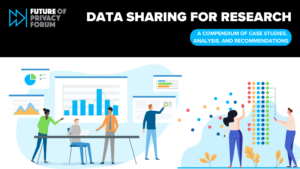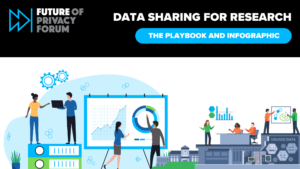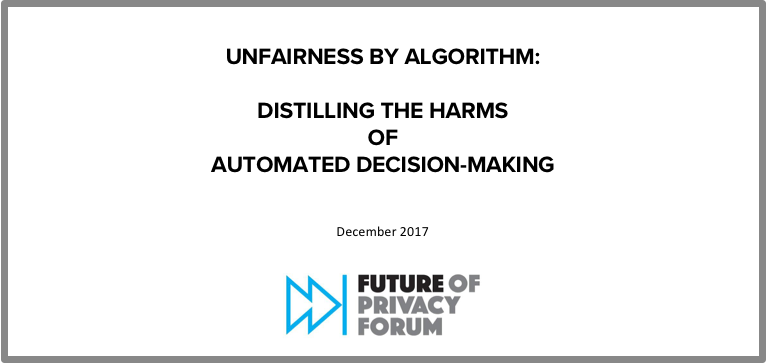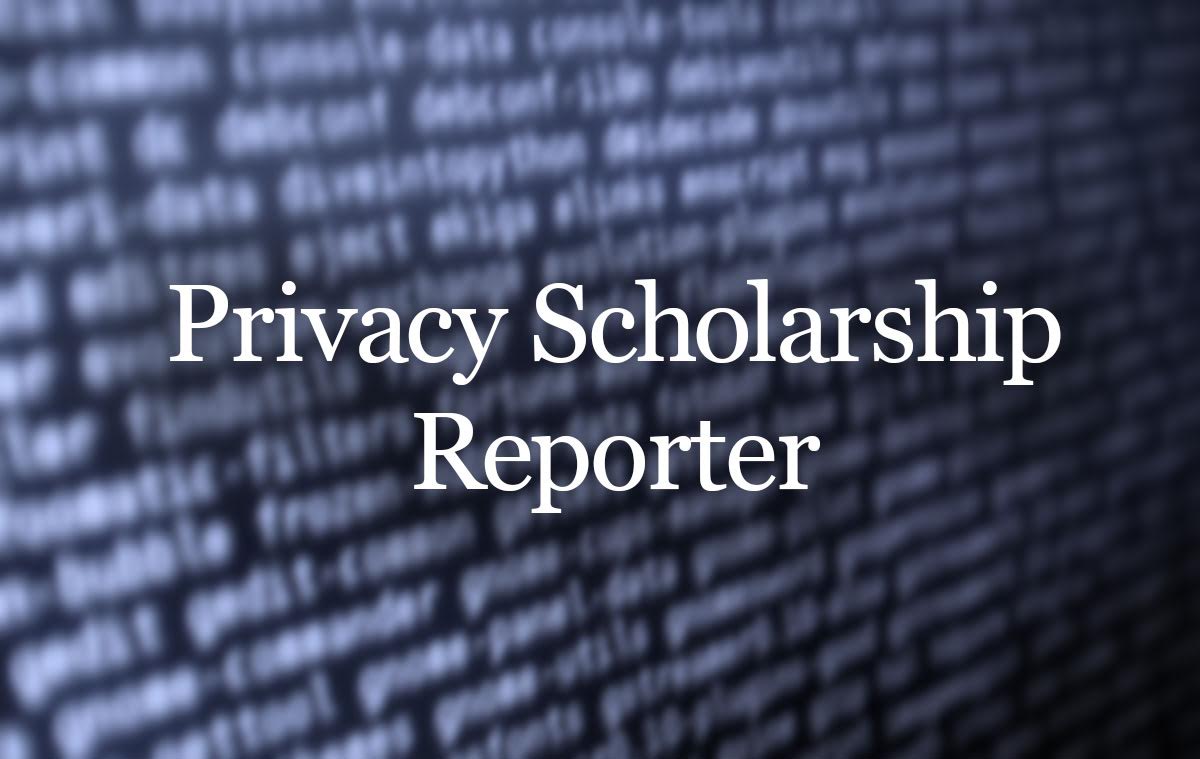Research often requires using sensitive data to answer important questions. The ethical collection and analysis of personal information can be challenging to do while still protecting the privacy of the implicated individuals, honoring informed consent, and complying with other legal obligations. The technology, policies, and ethical considerations for researchers are constantly shifting, sometimes making it difficult to keep up. That’s why FPF engages stakeholders across academia and industry to produce recommendations, best practices, and ethical review structures that promote responsible research. Our work is centered around streamlining, encouraging, and promoting responsible research that respects essential privacy and ethical considerations throughout the research lifecycle. FPF works with policymakers to develop legislative protections that support effective, responsible research with strong privacy safeguards, including hosting events that allow policymakers and regulators to engage directly with practitioners from academia, advocacy, and industry.
FPF also has an Ethics and Data in Research Working Group. This group receives late-breaking analysis of emerging legislation affecting research and data, meets to discuss the ethical and technological challenges of conducting research, and collaborates to create best practices to protect privacy, decrease risk, and increase data sharing for research, partnerships, and infrastructure. Learn more and join here.
Featured
New Future of Privacy Forum Study Finds the City of Seattle’s Open Data Program a National Leader in Privacy Program Management
Today, the Future of Privacy Forum released its City of Seattle Open Data Risk Assessment. The Assessment provides tools and guidance to the City of Seattle and other municipalities navigating the complex policy, operational, technical, organizational, and ethical standards that support privacy-protective open data programs.
Unfairness By Algorithm: Distilling the Harms of Automated Decision-Making
Analysis of personal data can be used to improve services, advance research, and combat discrimination. However, such analysis can also create valid concerns about differential treatment of individuals or harmful impacts on vulnerable communities. These concerns can be amplified when automated decision-making uses sensitive data (such as race, gender, or familial status), impacts protected classes, or affects individuals’ eligibility for housing, employment, or other core services. When seeking to identify harms, it is important to appreciate the context of interactions between individuals, companies, and governments—including the benefits provided by automated decision-making frameworks, and the fallibility of human decision-making.
Understanding Corporate Data Sharing Decisions: Practices, Challenges, and Opportunities for Sharing Corporate Data with Researchers
Today, the Future of Privacy Forum released a new study, Understanding Corporate Data Sharing Decisions: Practices, Challenges, and Opportunities for Sharing Corporate Data with Researchers. In this report, we aim to contribute to the literature by seeking the “ground truth” from the corporate sector about the challenges they encounter when they consider making data available for academic research. We hope that the impressions and insights gained from this first look at the issue will help formulate further research questions, inform the dialogue between key stakeholders, and identify constructive next steps and areas for further action and investment.
New Study: Companies are Increasingly Making Data Accessible to Academic Researchers, but Opportunities Exist for Greater Collaboration
Washington, DC – Today, the Future of Privacy Forum released a new study, Understanding Corporate Data Sharing Decisions: Practices, Challenges, and Opportunities for Sharing Corporate Data with Researchers. In this report, FPF reveals findings from research and interviews with experts in the academic and industry communities. Three main areas are discussed: 1) The extent to which leading companies make data available to support published research that contributes to public knowledge; 2) Why and how companies share data for academic research; and 3) The risks companies perceive to be associated with such sharing, as well as their strategies for mitigating those risks.
FPF Advisory Board Member Amie Stepanovich Discusses 'Why Inclusion Matters'
Yesterday, Future of Privacy Forum Advisory Board Member, Amie Stepanovich, U.S. Policy Manager at Access Now, published an article explaining the importance of ensuring marginalized communities have greater influence on how emerging technologies are being developed.
2nd Annual McGowan Forum on Ethics: The Challenge of Big Data
On October 26, 2017, John Verdi, FPF’s Vice President of Policy, was a panelist for the National Archives Foundation’s 2nd Annual McGowan Forum on Ethics: The Challenge of Big Data. The panel discussed the ethical responsibility of those who compile and track citizens’ personal data. The conversation focused around what responsibility corporations and governments have to protect their customers and be transparent in regard to possible data hacks.
Artificial Intelligence, Machine Learning, and Ethical Applications
On September 25, 2017, the Future of Privacy Forum and the Information Accountability Foundation will co-host an official side event at the International Conference of Data Protection Commissioners. The event follows IAF’s publication of Artificial Intelligence, Ethics and Enhanced Data Stewardship, and FPF’s curation of leading research highlighting the privacy challenges posed by artificial intelligence.
Bridging Industry and Academia to Tackle Responsible Research and Privacy Practices
As more human interactions move online and the amount and variety of information shared digitally continues to grow, decisions regarding the collection, sharing, and use of this data must take into account both ethical and privacy considerations. It is important that industry and academia come together to find joint solutions for making these difficult decisions regarding privacy and ethics to maximize the benefits of data-driven research and practices, while ensuring that harms and negative outcomes are prevented.
Privacy Protective Research: Facilitating Ethically Responsible Access to Administrative Data
Jules Polonetsky, CEO, Future of Privacy Forum, Omer Tene, Senior Fellow, Future of Privacy Forum, and Daniel Goroff, Vice President and Program Director, Alfred P. Sloan Foundation authored a paper titled Privacy Protective Research: Facilitating Ethically Responsible Access to Administrative Data. This paper will be featured in an upcoming edition of The Annals of the American Academy of Political and Social Science.
Announcing the Inaugural Issue of Future of Privacy Forum's Privacy Scholarship Reporter
Future of Privacy Forum is pleased to announce it has published the inaugural issue of the Privacy Scholarship Reporter. This regular newsletter will highlight recent privacy research and is published by the Privacy Research and Data Responsibility Network (RCN), an FPF initiative supported by the National Science Foundation.















